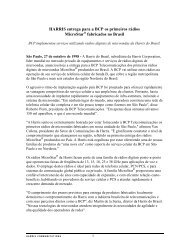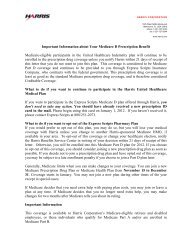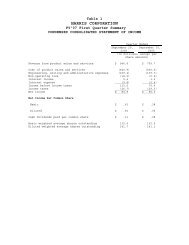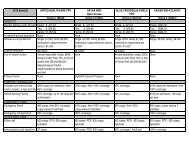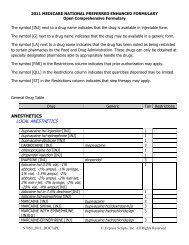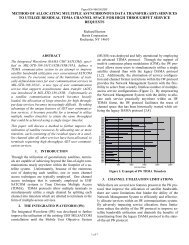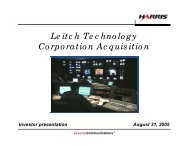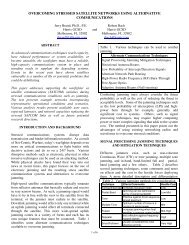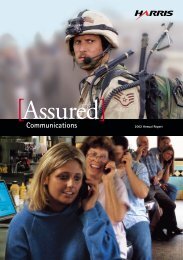harris corporation
harris corporation
harris corporation
Create successful ePaper yourself
Turn your PDF publications into a flip-book with our unique Google optimized e-Paper software.
endered against us in litigation or arbitration in existence at July 1, 2011 are reserved against, covered by insurance<br />
or would not have a material adverse effect on our financial condition, results of operations or cash flows.<br />
U.S. Government Business. U.S. Government contractors, such as us, are engaged in supplying goods and<br />
services to the U.S. Government and its various agencies. We are therefore dependent on Congressional<br />
appropriations and administrative allotment of funds and may be affected by changes in U.S. Government policies.<br />
U.S. Government contracts typically involve long lead times for design and development, are subject to significant<br />
changes in contract scheduling and may be unilaterally modified or cancelled by the U.S. Government. Often these<br />
contracts call for successful design and production of complex and technologically advanced products or systems.<br />
We may participate in supplying goods and services to the U.S. Government as either a prime contractor or as a<br />
subcontractor to a prime contractor. Disputes may arise between the prime contractor and the U.S. Government and<br />
the prime contractor and its subcontractors and may result in litigation or arbitration between the contracting parties.<br />
Generally, U.S. Government contracts are subject to procurement laws and regulations, including the Federal<br />
Acquisition Regulation (“FAR”), which outline uniform policies and procedures for acquiring goods and services by<br />
the U.S. Government, and specific agency acquisition regulations that implement or supplement the FAR, such as<br />
the Defense Federal Acquisition Regulation Supplement. As a U.S. Government contractor, our contract costs are<br />
audited and reviewed on a continuing basis by the Defense Contract Audit Agency (“DCAA”). The DCAA also<br />
reviews the adequacy of, and a U.S. Government contractor’s compliance with, the contractor’s internal control<br />
systems and policies, including the contractor’s accounting, purchasing, property, estimating, compensation and<br />
management information systems. In addition to these routine audits, from time to time, we may, either individually<br />
or in conjunction with other U.S. Government contractors, be the subject of audits and investigations by other<br />
agencies of the U.S. Government. These audits and investigations are conducted to determine if our performance<br />
and administration of our U.S. Government contracts are compliant with applicable contractual requirements and<br />
procurement and other applicable Federal laws and regulations. These investigations may be conducted without our<br />
knowledge. We are unable to predict the outcome of such investigations or to estimate the amounts of resulting<br />
claims or other actions that could be instituted against us, our officers or employees. Under present<br />
U.S. Government procurement laws and regulations, if indicted or adjudged in violation of procurement or other<br />
Federal laws, a contractor, such as us, or one or more of our operating divisions or subdivisions, could be subject to<br />
fines, penalties, repayments, or compensatory or treble damages. U.S. Government regulations also provide that<br />
certain findings against a contractor may lead to suspension or debarment from eligibility for awards of new<br />
U.S. Government contracts for up to three years. Suspension or debarment would have a material adverse effect on<br />
us because of our reliance on U.S. Government contracts. In addition, our export privileges could be suspended or<br />
revoked. Suspension or revocation of our export privileges also would have a material adverse effect on us. For<br />
further discussion of risks relating to U.S. Government contracts, see “Item 1A. Risk Factors” of this Report.<br />
International. As an international company, we are, from time to time, the subject of investigations relating to<br />
our international operations, including under the U.S. export control laws, the U.S. Foreign Corrupt Practices Act<br />
and similar U.S. and international laws.<br />
Environmental. We are subject to numerous U.S. Federal, state and international environmental laws and<br />
regulatory requirements and are involved from time to time in investigations or litigation of various potential<br />
environmental issues concerning activities at our facilities or former facilities or remediation as a result of past<br />
activities (including past activities of companies we have acquired). From time to time, we receive notices from the<br />
U.S. Environmental Protection Agency or equivalent state or international environmental agencies that we are a<br />
potentially responsible party under the Comprehensive Environmental Response, Compensation and Liability Act<br />
(commonly known as the “Superfund Act”) and/or equivalent laws. Such notices assert potential liability for cleanup<br />
costs at various sites, which include sites owned by us, sites we previously owned and treatment or disposal sites not<br />
owned by us, allegedly containing hazardous substances attributable to us from past operations. We own, previously<br />
owned or are currently named as a potentially responsible party at 14 such sites, excluding sites as to which our<br />
records disclose no involvement or as to which our liability has been finally determined. While it is not feasible to<br />
predict the outcome of many of these proceedings, in the opinion of our management, any payments we may be<br />
required to make as a result of such claims in existence at July 1, 2011 will not have a material adverse effect on<br />
our financial condition, results of operations or cash flows. Additional information regarding environmental matters<br />
is set forth in Note 1: Significant Accounting Policies in the Notes, which information is incorporated herein by<br />
reference, and in “Item 1. Business — Environmental and Other Regulations” of this Report.<br />
HSTX Securities Litigation. HSTX and certain of its current and former officers and directors, including<br />
certain current Harris officers, were named as defendants in a federal securities class action complaint filed on<br />
September 15, 2008 in the United States District Court (the “Court”) for the District of Delaware by plaintiff<br />
27




